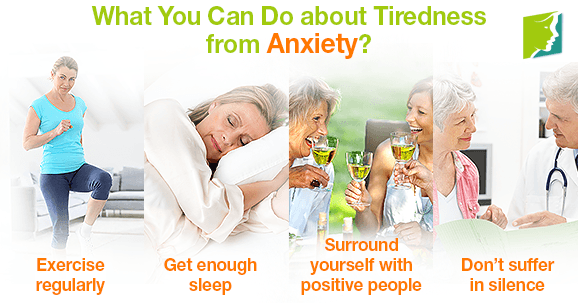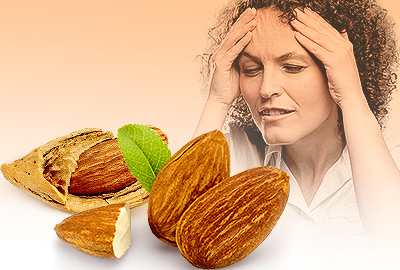Anxiety is a feeling of worry; it keeps the person focused and concentrated on the problem at hand. The anxiety response involves a rush of adrenaline, contracted muscles, and a suppressed immune system; thus, a prolonged anxiety response can be harmful to psychological and physical health. One of the symptoms of the body being on constant “high alert” is tiredness. This tiredness should disappear once the anxiety has been dealt with, so the anxiety should be the first priority. Read on to find out how to deal with anxiety and therefore tiredness.
Exercise Regularly
It is normally recommended to do at least 150 minutes of exercise every week for overall health, but it can also have a positive effect on anxiety, too. Physical activity encourages the release of serotonin and endorphins, which naturally elevate mood. It also promotes good sleeping patterns, which anxiety can disrupt, and is part of the reason tiredness is often a symptom. Read about low impact exercises for anxiety.
Get Enough Sleep
This seems like common sense, but it is worth reiterating the importance of promoting good sleep. Many people think there is little they can do if they suffer from insomnia, but this is not true. Developing a few good habits can normally get the sleep cycle back on track - this leads to fewer irrational thoughts and therefore a decline in anxiety levels and tiredness. Avoid caffeine and alcohol, drink an herbal tea, take a warm bath prior to bedtime, and keep the bedroom cool, dark, and quiet. Read about home remedies for anxiety and sleep.
Don't Spend Too Much Time Around Negative People
Human beings are sensitive to the emotions of others and are quick to pick up on cues. Spending time with overly negative or anxious people is only going to bring your mood down, too, and worsen your own anxiety - and this is going to do nothing for relieving anxiety-related tiredness. Surrounding yourself with positive people will mean your own destructive thoughts are not being reinforced, and you might even find your own outlook on life becomes more positive, too.
Don't Suffer in Silence
Anxiety can keep sufferers awake at night as they focus on their worries, often getting them out of proportion. Talking to somebody else about your feelings will give you some perspective and lead the mind to stop obsessing about the perceived problems. It could also serve a practical purpose in that other people could help you see or devise a solution. Humans are not built to be solitary creatures, so isolating yourself and not discussing your worries is only going to intensify tiredness from anxiety.
Tiredness is a common symptom of anxiety, so dealing with anxiety as the root cause will, in turn, decrease it. If you implement the aforementioned self-help therapies but the tiredness persists, it is important to talk to a doctor, as unreasonable fatigue can sometimes be indicative of an underlying medical condition that requires treatment.
Sources
- Anxiety and Depression Association of America. (2014). Social Anxiety Disorder. Retrieved September 5, 2014, from http://www.adaa.org/understanding-anxiety/social-anxiety-disorder
- Anxiety and Depression Association of America. (2014). Symptoms. Retrieved September 5, 2014, from http://www.adaa.org/understanding-anxiety/panic-disorder-agoraphobia/symptoms
- Leproult, R. et al. (1997). Sleep loss results in an elevation of cortisol levels the next evening. Sleep, 20(10), 865-870. Retrieved from http://www.ncbi.nlm.nih.gov/pubmed/9415946
- National Health Service UK. (2014). Generalised anxiety disorder. Retrieved September 5, 2014, from http://www.nhs.uk/conditions/anxiety/pages/introduction.aspx
- National Health Service UK. (2014). Stress, anxiety and depression: The types of therapy. Retrieved September 5, 2014, from http://www.nhs.uk/Conditions/stress-anxiety-depression/Pages/types-of-therapy.aspx
- National Institutes of Health. (2014). Anxiety. Retrieved September 5, 2014, from http://www.nlm.nih.gov/medlineplus/anxiety.html
- National Institute of Mental Health. (n.d). Anxiety Disorders. Retrieved September 5, 2014, from http://www.nimh.nih.gov/health/publications/anxiety-disorders/index.shtml?wvsessionid=wv650bd43245ce405884dd789794894544#pub2
- National Institute of Mental Health. (n.d). What is Anxiety Disorder? Retrieved September 5, 2014, from http://www.nimh.nih.gov/health/topics/anxiety-disorders/index.shtml
- University of California Los Angeles. (2013). UCLA neuroscientist's book explains why social connection is as important as food and shelter. Retrieved September 5, 2014, from http://newsroom.ucla.edu/releases/we-are-hard-wired-to-be-social-248746




